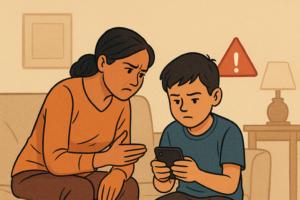Ahmed Fokhrul
In our digital age, it’s not uncommon to find members of Gen Z staying up late into the night, their faces illuminated by the glow of screens. Whether it’s scrolling through social media, binge-watching the latest series, or conquering levels in video games, this generation seems to be trading precious sleep for screen time. While the allure of digital entertainment is strong, the consequences of sleep deprivation are too significant to ignore. So, what’s driving this trend, and more importantly, what can be done about it?
Why Gen Z is Losing Sleep
The appeal of digital devices is undeniable. Social media platforms are designed to be addictive, with endless scrolling and constant notifications keeping users engaged far longer than intended. Video games offer immersive experiences that can make hours feel like mere minutes. For Gen Z, who have grown up with technology at their fingertips, the boundaries between day and night often blur, leading to late-night screen sessions.
But there’s more to the story. The blue light emitted by phones, tablets, and computers mimics daylight, which can interfere with the body’s natural sleep cycle. This light disrupts the production of melatonin, the hormone responsible for making us feel sleepy, tricking the brain into staying alert even when it’s time to wind down.
The Impact of Sleep Deprivation
The effects of trading sleep for screens go beyond just feeling tired the next day. Chronic sleep deprivation can have serious long-term consequences on both physical and mental health. Some of the most common issues include:
- Cognitive Decline: Lack of sleep impairs memory, focus, and decision-making abilities, making it harder to perform well in school or work.
- Emotional Instability: Sleep-deprived individuals are more prone to mood swings, irritability, and even depression.
- Weakened Immune System: Consistently missing out on sleep can make it harder for the body to fight off illnesses.
- Increased Risk of Chronic Conditions: Over time, sleep deprivation can contribute to more serious health issues, such as obesity, diabetes, and heart disease.
What Can Be Done?
If you or someone you know is part of Gen Z and struggling to balance screen time with sleep, there are several steps you can take to improve the situation:
- Establish a Bedtime Routine: Consistency is key when it comes to sleep. Try to go to bed and wake up at the same time every day, even on weekends. This helps regulate your body’s internal clock.
- Create a Screen-Free Zone: Keep phones, tablets, and laptops out of the bedroom. This reduces the temptation to stay up late scrolling or gaming and helps create an environment conducive to sleep.
- Limit Screen Time Before Bed: Ideally, try to avoid screens for at least an hour before bedtime. Instead, engage in relaxing activities such as reading a book, listening to calming music, or practicing mindfulness.
- Use Technology Wisely: If you must use screens in the evening, consider enabling night mode or using blue light filters, which reduce the amount of blue light emitted by your devices.
- Avoid Caffeine in the Evening: Be mindful of what you consume in the hours leading up to bedtime. Caffeinated beverages can interfere with your ability to fall asleep, so try to avoid them in the late afternoon and evening.
- Educate and Encourage: For parents and guardians, it’s essential to educate Gen Z on the importance of sleep and encourage healthy habits. Set clear rules about screen time, particularly during the night, and lead by example.
Final Thoughts
While the digital world offers endless entertainment and opportunities for connection, it’s crucial for Gen Z to recognize the value of a good night’s sleep. By making small changes in daily habits, it’s possible to enjoy the best of both worlds—staying connected while also prioritizing health and well-being. Remember, sleep is not a luxury; it’s a necessity.



